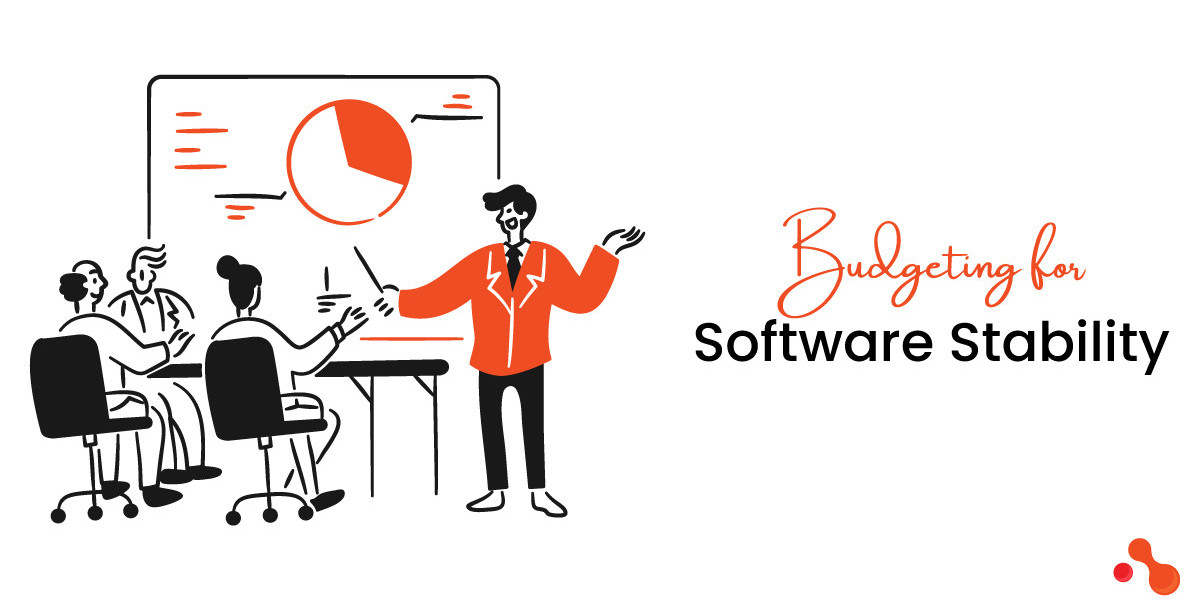Introduction
The dynamic nature of software projects, characterized by changing requirements, technological advancements, and unforeseen challenges, demands a proactive and strategic approach to budget control.
This comprehensive blog explores the essence of cultivating a software budget control mindset, offering insights and strategies to ensure financial stability and precision throughout the lifecycle of software projects. As organizations increasingly rely on software development to drive innovation and growth, effective budget planning becomes paramount.
What is a Budget Control Mindset?

The budget control mindset in software development is an overarching approach that emphasizes foresight, flexibility, and continuous improvement in financial planning and management. It's about anticipating potential budgetary issues, adapting to changes without compromising financial health. This also includes learning from each project to refine future budgets.
This mindset is crucial for project managers, financial planners, and development teams aiming to deliver high-quality software within the constraints of time and budget.
It refers to a set of attitudes, principles, and approaches that individuals and organizations adopt to manage and control budgets effectively. It involves a proactive and disciplined approach toward financial planning, monitoring, and decision-making. This ensures that a project or organization operates within its allocated financial resources.
Here are key elements that characterize a budget control mindset:
- Proactive planning
- Data-driven decision-making
- Risk identification and mitigation
- Continuous learning and improvement
- Transparent communication
- Adaptive approach
- Precision in cost estimation
- Strategic vendor management
- Contingency planning
- Quality assurance focus
- Post-implementation considerations
- Client-centric collaboration
- Efficient resource utilization
- Legal and regulatory compliance focus
Importance of Precision Budget Control
Precision budget control is of utmost importance in various aspects of business and project management. Here are key reasons why precision in budget control is crucial:
- Ensures that resources, including manpower, technology, and materials, are optimized efficiently.
- This accuracy is crucial for creating realistic budgets, preventing cost overruns, and allowing organizations to allocate funds effectively.
- Identify potential risks early in the project or business cycle.
- Ensures financial stability by preventing budget deviations.
- It instills confidence in decision-making.
- Contributes to client trust and satisfaction.
This quote explains it well:
“The cost of adding a feature isn’t just the time it takes to code it. The cost also includes the addition of an obstacle to future expansion. The trick is to pick the features that don’t fight each other.” - John Carmack
The Pillars of Budget Control Mindset

Proactive Planning: Anticipating costs and risks early in the project lifecycle to create a realistic and flexible budget.
Agile Project Management:
Adapting to changes in project scope, resources, and timelines while keeping the budget aligned with project goals.
Stakeholder Engagement:
Ensuring continuous communication with stakeholders about budget status, risks, and adjustments.
Continuous Learning:
Applying lessons learned from past projects to improve budget estimation, management, and control processes.
Understand Project Scope:
Begin by thoroughly understanding the project scope. What features or functionalities are essential? What are nice-to-haves? Clear requirements will guide your budgeting process.
Break Down Tasks:
Divide the project into smaller tasks or user stories. This granularity allows for more accurate estimation and better resource allocation.
Account for Risks:
Identify potential risks that could impact the project timeline or budget. Allocate contingency funds to handle unforeseen challenges.
Strategies for Implementing a Budget Control Mindset

Define Clear Project Objectives and Scope:
Establishing a clear understanding of the project's goals and boundaries is the first step in proactive budget planning. This clarity helps in avoiding scope creep and ensures that budget estimations are aligned with project expectations.
Conduct Thorough Risk Analysis:
Identifying potential risks and their financial implications early allows for the inclusion of contingencies in the budget, reducing the impact of unforeseen challenges.
Use Historical Data:
Leverage data from previous projects to inform budget estimations, recognizing patterns in cost overruns and identifying areas where savings can be made.
Adopt an Agile Approach:
Implement agile methodologies not just in project management but in budget management as well. Agile budgeting allows for iterative reassessment and reallocation of funds based on project progress and changing requirements.
Monitor and Adjust in Real-Time:
Utilize financial tracking tools to monitor expenditures and project progress continuously. This enables immediate adjustments to the budget, preventing minor issues from escalating into major financial setbacks.
Emphasize Value Over Costs:
Focus on delivering value to the customer or end-user. This involves prioritizing project features and tasks based on their value contribution versus their cost, ensuring that the budget is spent on high-impact areas.
Maintain Transparent Communication:
Keep stakeholders informed about the project's financial status, including potential risks and necessary budget adjustments. Transparency builds trust and facilitates smoother decision-making processes.
Involve Stakeholders in Financial Planning:
Engage stakeholders in the budgeting process to align expectations and secure buy-in for budget plans and adjustments.
Regularly Review Budget Performance with Stakeholders:
Conduct periodic reviews of the budget's performance, discussing variances and lessons learned to improve future planning.
Conduct Post-Project Reviews:
After the completion of a project, conduct a thorough review to identify what went well and what didn't in terms of budget management. This should involve all project team members and relevant stakeholders.
Document Lessons Learned:
Maintain a repository of lessons learned, especially those related to financial planning and management. This knowledge base becomes a valuable resource for improving budget accuracy and control in future projects.
Invest in Training and Development:
Encourage continuous learning among project managers and team members in financial management, agile methodologies, and risk analysis to enhance their skills in budget control.
Gain a holistic perspective:
Develop a comprehensive understanding of the entire project, including its scope, goals, and potential challenges. A holistic perspective ensures that budget considerations are aligned with the project's overall objectives.
Data-Driven Decision-Making:
Embrace a data-driven mindset when making budget-related decisions. Utilize historical data, benchmarks, and performance metrics to inform decisions and enhance the precision of budget estimates.
Proactive Risk Identification:
Cultivate a proactive mindset toward risk identification. Anticipate potential risks and uncertainties that could impact the budget. Early identification allows for strategic risk mitigation planning.
Continuous Learning and Improvement:
Foster a culture of continuous learning within the team. Analyze past projects, identify areas for improvement, and apply insights to refine budgeting processes continually.
Realistic Resource Allocation:
Prioritize realistic resource allocation based on project requirements. Avoid overcommitting or underestimating resource needs, as this can lead to instability and imprecision in budgeting.
Transparent Communication:
Emphasize transparent communication with stakeholders. Clearly communicate budget constraints, expectations, and any changes that may impact the budget. Transparency builds trust and fosters a collaborative atmosphere.
Agile and Adaptive Approach:
Embrace an agile and adaptive mindset. Recognize that changes are inevitable, and be prepared to adapt the budget dynamically to accommodate evolving project requirements.
Precision in Cost Estimation:
Focus on precision in cost estimation. Break down costs into granular details and consider all relevant factors to create accurate and realistic budget estimates.
Strategic Vendor Management:
Approach vendor management strategically. Negotiate terms upfront, monitor vendor performance closely, and ensure that external partnerships align with the project's budgetary goals.
Contingency Planning:
Adopt a mindset that recognizes the importance of contingencies. Allocate a reasonable portion of the budget for unforeseen events and changes, providing a safety net for unexpected expenses.
Quality Assurance Focus:
Prioritize quality assurance practices. Recognize that investing in thorough testing and quality control contributes to stability by preventing costly rework and ensuring a reliable software product.
Post-Implementation Considerations:
Extend the budgeting mindset beyond development. Plan for post-implementation activities, including support, maintenance, and potential updates, to ensure the long-term stability of the software solution.
Client-Centric Collaboration:
Cultivate a client-centric mindset. Collaborate closely with clients, seeking regular feedback to align the software solution with their expectations and minimize the risk of costly revisions.
Efficient Resource Utilization:
Optimize resource utilization efficiently. Ensure that team members are aligned with their skill sets, avoiding unnecessary expenditures on underutilized or misallocated resources.
Pitfalls to Avoid
Over-Optimistic Estimates:
Unrealistically optimistic estimates can lead to missed deadlines and cost overruns. Be conservative in your projections.
Ignoring Hidden Costs:
Beyond direct development costs (e.g., salaries), consider other expenses like licenses, tools, infrastructure, and maintenance.
Scope Creep:
Uncontrolled changes in project scope can disrupt budgets. Implement a change management process to handle scope changes effectively.
Underestimating Testing and QA:
Testing is crucial but often underestimated. Allocate sufficient resources for thorough testing.
A good example of unforeseen expense causing cost overrun in a project is the Central Artery/Tunnel Project, known as the Big Dig. This was a highway construction project in Boston. Originally estimated at $2.8 billion, it ended up costing over $14.6 billion, primarily due to engineering complexities, design changes, and unforeseen issues during construction.
There are many reasons why software projects end up in cost overruns. Here are a few statistics for the same:
- The cost overrun for software projects on an average is 27%.
- Communication breakdown is the reason for project failure in 57% of the projects.
- Problems with planning affect 39% of the projects.
Nuances of Software Development Budgets
Agile Budgeting:
Agile methodologies require adaptive budgeting. Frequent reassessment ensures alignment with changing priorities.
Incremental Funding:
Rather than allocating the entire budget upfront, consider total funding based on project milestones or sprints.
Talent Management:
Invest in skilled developers who understand both technology and business needs.
Flexible IT Architecture:
A rigid architecture can hinder agility. Invest in scalable systems that accommodate future changes.
Cultivate a Culture of Financial Discipline
Beyond individual mindset and tools, fostering a culture of financial discipline within the organization is critical. This involves setting clear economic policies, encouraging open discussions about budgetary concerns, and recognizing team members who contribute to effective budget management. A culture that values financial discipline supports the budget control mindset, leading to more predictable and successful project outcomes.
Benefits of Budget Control Mindset
Adopting a budget control mindset offers a range of benefits for individuals, teams, and organizations involved in project management and financial planning.
Here are key advantages associated with a budget control mindset:
Financial Stability:
Ensures financial stability by preventing overspending and unexpected financial setbacks.
Resource Optimization:
Fosters efficient resource utilization by optimizing manpower, technology, and materials, avoiding wastage. Ensure that resource allocation yields most value.
Risk Mitigation:
This allows for the development of effective risk mitigation strategies, reducing the impact of unforeseen events on project timelines and financial health.
Accurate Cost Estimation:
Organizations can create realistic budgets, preventing cost overruns and ensuring that funds are allocated appropriately to meet project requirements.
Strategic Decision-Making:
Organizations can make informed and strategic decisions based on precise financial data.
Client Trust and Satisfaction:
Clients are more likely to be satisfied when budgets are accurate and adhered to, fostering positive relationships and repeat business opportunities.
Efficient Project Delivery:
Projects are delivered more efficiently when budget control is a priority. Teams can focus on achieving milestones without disruptions caused by unexpected financial challenges, leading to timely project completion.
Improved Forecasting:
Enhances the accuracy of financial forecasting. Organizations can make more reliable predictions about future expenses, revenues, and overall financial performance, aiding in strategic planning.
Legal and Regulatory Compliance:
Adhering to legal and regulatory requirements is facilitated by a budget control mindset. Accurate financial tracking ensures compliance, preventing potential legal complications and associated penalties.
Enhanced Accountability:
Team members and stakeholders take responsibility for adhering to budgetary constraints, promoting a sense of ownership and responsibility.
Adaptability to Changes:
It enables quick adjustments to the budget to accommodate new opportunities or unforeseen challenges.
Continuous Improvement:
Organizations with a budget control mindset are more likely to engage in constant improvement. They analyze budget performance, identify areas for enhancement, and refine budgeting processes for future projects.
Financial Confidence:
Instills confidence in financial management. Organizations and individuals can navigate financial challenges with assurance, knowing that they have the discipline and tools in place to control their budgets effectively.
Stakeholder Confidence:
Stakeholders, including investors, clients, and team members, have increased confidence in projects or organizations with a firm budget control mindset.
Promotes Long-Term Success:
Contributes to the long-term success of organizations. It establishes a foundation for financial sustainability, adaptability, and strategic growth, positioning the organization for continued success in a competitive landscape.
Cost-Effective Solutions With Acquaint Softtech
Hire remote developers from Acquaint Softtech for a cutting-edge software solution. Our expertise involves ensuring the stability and precision of your software budget.
Besides which, the team is also technically sound and has exposure to a wide range of industries worldwide. We believe in making quality solutions available to all. Your business can benefit from the fact that over the years we have developed a budget control mindset.
Conclusions
Adopting a software budget control mindset is a multifaceted approach that requires proactive planning, agile financial management, stakeholder engagement, and a commitment to continuous learning.
Implementing innovative strategies and utilizing the tools discussed by software development teams can enhance their ability to manage budgets with excellent stability and precision. Cultivating this mindset and culture within an organization is not an overnight task. However, the rewards in terms of financial predictability, project success, and stakeholder satisfaction are well worth the effort.
Hiring a software outsourcing company like Acquaint Softtech will always work in your favor. In the dynamic world of software development, where uncertainty is the only constant, a budget control mindset is your compass, guiding your projects to financial stability and success..














